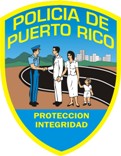 [1]On October 6th the Federal Bureau of Investigations (FBI) arrested 133 people in Puerto Rico, including 89 police officers, in what the US Department of Justice called “the biggest police corruption investigation in the history of the FBI” [2]. The police officers were accused of providing protection to local drug dealers. This represents a very serious blow to the already tarnished reputation of Puerto Rico’s police department after very high profile cases of police brutality the past few months. Puerto Ricans are wondering how and why things have fallen so low.
[1]On October 6th the Federal Bureau of Investigations (FBI) arrested 133 people in Puerto Rico, including 89 police officers, in what the US Department of Justice called “the biggest police corruption investigation in the history of the FBI” [2]. The police officers were accused of providing protection to local drug dealers. This represents a very serious blow to the already tarnished reputation of Puerto Rico’s police department after very high profile cases of police brutality the past few months. Puerto Ricans are wondering how and why things have fallen so low.
Criminal justice professor Gary Gutiérrez [3] worries in an article for the digital online magazine 80 Grados [4] [ES] about the delegitimization of the authority of the police after these arrests:
Esa deslegitimación del oficial del orden público, justificada o no, puede ser peligrosa pues termina fomentando el espiral de violencia social. Si las instituciones del país, como la Policía, se ven como ilegítimas, los ciudadanos no tienen por que someterse a su autoridad.
Gutiérrez urges his readers to look at this problem of police corruption not as something that exists outside society, but rather as a product of a consumerist society:
Son frutos de una sociedad cuya cultura se basa en acaparar bienes de consumo que se convierten en símbolos del éxito. Esta es una sociedad donde el valor del individuo no radica en su capacidad de producir, ayudar y solidarizarse con el colectivo.
The team of the #EnProfundo [5][ES] podcast also discussed the possible causes for such widespread police corruption on its 29th episode on October 10th [6]. Twitter user @Martillo20lbs [7], a military police officer, was a special guest and he voiced his opinion on why the police is so prone to corruption and to the use of unnecessary force.
@Martillo20lbs argued that one of the main causes was politicians promising an increase in the number of police officers as part of their campaign promises. This has resulted in lax and dangerous practices by the police department which is under pressure to recruit whatever artificial number of police officers politicians have set:
…tú pasas ese screening inicial y lo único que tienes que hacer es ir a la academia y graduarte. That’s it. Ese es el problema fundamental en Puerto Rico: que no hacen un debido screening de todos los aplicantes…
@Martillo20lbs states that this lack of screening combined with inadequate training results in a corrupt culture:
…la Policía de Puerto Rico no tiene una cultura en donde tiene unos valores centrales, que es proteger la vida del ser humano y velar por los intereses de la población de Puerto Rico. El policía que llega ahora mismo a la Policía de Puerto Rico llega o porque no tiene dinero o porque salió del caserío y el bichote lo está mandando para la Policía de Puerto Rico para que cuando salga pida el traslado hacia su caserío y continue haciendo lo que estaba haciendo.
Just like Gutiérrez, @Martillo20lbs argues that developing a social conscience is central to changing the culture of corruption.
…el que se metió a la policía de Puerto Rico para renumerar económicamente está mal, porque es un servidor público. Tú tienes que tener un cierto grado de devoción para combatir el crimen.
With a corruption problem that seems to be tied to deep rooted societal ills, Puerto Rico’s police seems to have a long road ahead to rebuild its reputation.